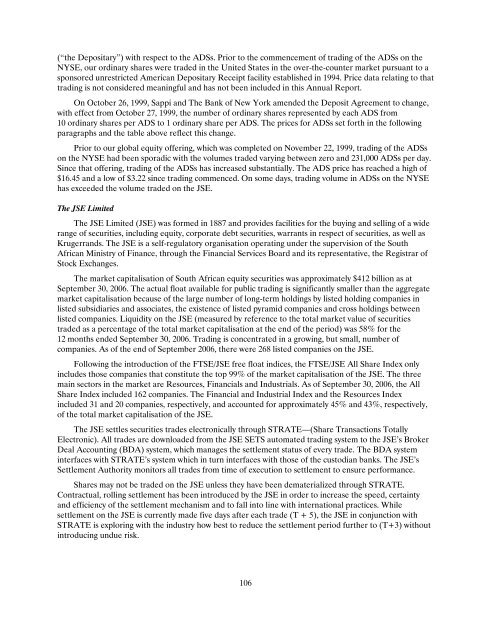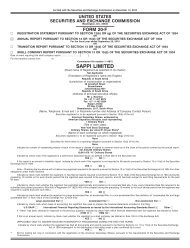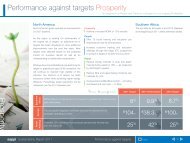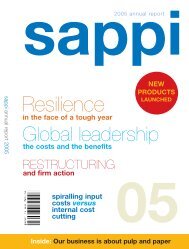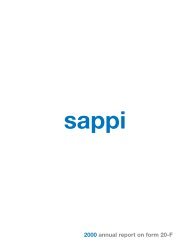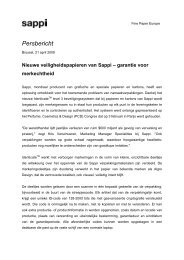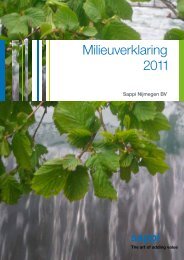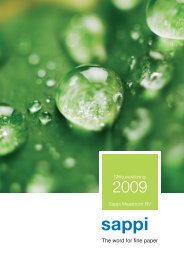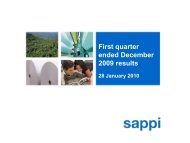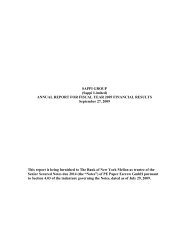Create successful ePaper yourself
Turn your PDF publications into a flip-book with our unique Google optimized e-Paper software.
(“the Depositary”) with respect to the ADSs. Prior to the commencement of trading of the ADSs on the<br />
NYSE, our ordinary shares were traded in the United States in the over-the-counter market pursuant to a<br />
sponsored unrestricted American Depositary Receipt facility established in 1994. Price data relating to that<br />
trading is not considered meaningful and has not been included in this Annual Report.<br />
On October 26, 1999, <strong>Sappi</strong> and The Bank of New York amended the Deposit Agreement to change,<br />
with effect from October 27, 1999, the number of ordinary shares represented by each ADS from<br />
10 ordinary shares per ADS to 1 ordinary share per ADS. The prices for ADSs set forth in the following<br />
paragraphs and the table above reflect this change.<br />
Prior to our global equity offering, which was completed on November 22, 1999, trading of the ADSs<br />
on the NYSE had been sporadic with the volumes traded varying between zero and 231,000 ADSs per day.<br />
Since that offering, trading of the ADSs has increased substantially. The ADS price has reached a high of<br />
$16.45 and a low of $3.22 since trading commenced. On some days, trading volume in ADSs on the NYSE<br />
has exceeded the volume traded on the JSE.<br />
The JSE Limited<br />
The JSE Limited (JSE) was formed in 1887 and provides facilities for the buying and selling of a wide<br />
range of securities, including equity, corporate debt securities, warrants in respect of securities, as well as<br />
Krugerrands. The JSE is a self-regulatory organisation operating under the supervision of the South<br />
African Ministry of Finance, through the Financial Services Board and its representative, the Registrar of<br />
Stock Exchanges.<br />
The market capitalisation of South African equity securities was approximately $412 billion as at<br />
September 30, <strong><strong>20</strong>06</strong>. The actual float available for public trading is significantly smaller than the aggregate<br />
market capitalisation because of the large number of long-term holdings by listed holding companies in<br />
listed subsidiaries and associates, the existence of listed pyramid companies and cross holdings between<br />
listed companies. Liquidity on the JSE (measured by reference to the total market value of securities<br />
traded as a percentage of the total market capitalisation at the end of the period) was 58% for the<br />
12 months ended September 30, <strong><strong>20</strong>06</strong>. Trading is concentrated in a growing, but small, number of<br />
companies. As of the end of September <strong><strong>20</strong>06</strong>, there were 268 listed companies on the JSE.<br />
Following the introduction of the FTSE/JSE free float indices, the FTSE/JSE All Share Index only<br />
includes those companies that constitute the top 99% of the market capitalisation of the JSE. The three<br />
main sectors in the market are Resources, Financials and Industrials. As of September 30, <strong><strong>20</strong>06</strong>, the All<br />
Share Index included 162 companies. The Financial and Industrial Index and the Resources Index<br />
included 31 and <strong>20</strong> companies, respectively, and accounted for approximately 45% and 43%, respectively,<br />
of the total market capitalisation of the JSE.<br />
The JSE settles securities trades electronically through STRATE—(Share Transactions Totally<br />
Electronic). All trades are downloaded from the JSE SETS automated trading system to the JSE’s Broker<br />
Deal Accounting (BDA) system, which manages the settlement status of every trade. The BDA system<br />
interfaces with STRATE’s system which in turn interfaces with those of the custodian banks. The JSE’s<br />
Settlement Authority monitors all trades from time of execution to settlement to ensure performance.<br />
Shares may not be traded on the JSE unless they have been dematerialized through STRATE.<br />
Contractual, rolling settlement has been introduced by the JSE in order to increase the speed, certainty<br />
and efficiency of the settlement mechanism and to fall into line with international practices. While<br />
settlement on the JSE is currently made five days after each trade (T + 5), the JSE in conjunction with<br />
STRATE is exploring with the industry how best to reduce the settlement period further to (T+3) without<br />
introducing undue risk.<br />
106


